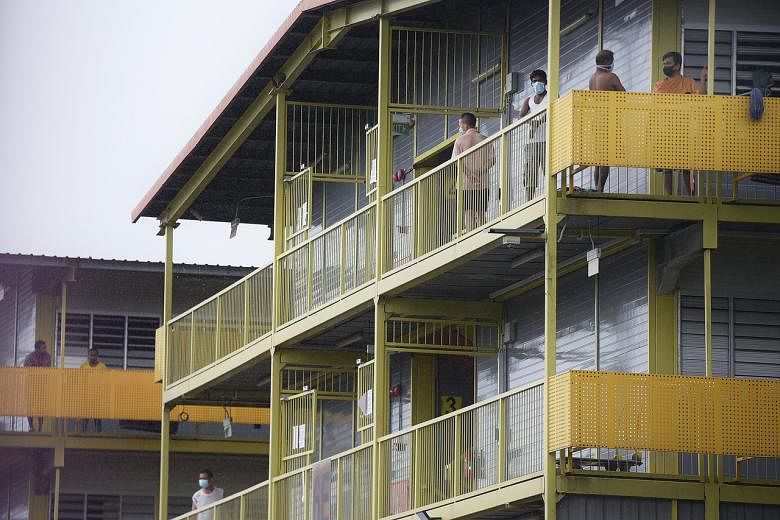SINGAPORE - About 60,000 bed spaces for migrant workers will be ready by the end of the year, with another 100,000 to be ready in the next few years, said National Development Minister Lawrence Wong on Monday (June 1).
These are part of efforts to reduce the density of dormitories, and make them more resilient to public health risks such as pandemics, he added in a virtual press conference.
The new dorms may not be completely filled, however. Excess capacity is being built so that workers can be moved from existing dorms so that they could be upgraded, said Mr Wong, co-chair of a multi-ministry task force handling the Covid-19 outbreak.
"This will be a major building programme that we are putting in place to build additional capacity with higher standards," he said.
The living conditions of foreign workers have come under scrutiny recently, with more than 90 per cent of Covid-19 cases in Singapore being foreign workers living in dorms.
The 60,000 bed spaces include "quick dorms", which are semi-permanent structures that could be assembled relatively quickly, said Mr Wong.
Other housing meant for the short and medium terms includes fitting out several unused state properties, as well as temporary on-site housing so that all workers involved in a project could be housed together.
For long-term solutions, 11 purpose-built dormitories will be built in the next two years and are meant for close to 60,000 workers.
The move to improve dorm standards is not being done for the first time, said Mr Wong, adding that this should be seen in the context of how dorm standards have been continually upgraded.
He also noted that the plan could mean dormitories closer to residential areas.
"I would also say that Singaporeans have to do our part as well, because in land-scarce Singapore, it is inevitable that some of these new dorm sites will be quite near residential areas, so all of us must do our part by rejecting the not-in-my-backyard mindset," he said.
"We really need to appreciate the contributions of all that our migrant workers have been doing... and we welcome them as part of our community. And this is an important part of how we can also learn from this whole experience and become a more inclusive society.
Asked about who would bear the costs of the building and operation of the new dormitories, Mr Wong said the Government was looking at several possibilities.
"It could be done on a build, own and lease model, where the Government builds and leases the asset. The leasing and operations of the dorms are done through a separate entity, doesn't have to be the Government; it could be a private entity, it could be an NGO, or VWO.
"So these are different models that exist today even in the running of various entities in Singapore. So we will study what's the best way of doing it, and eventually come to a decision on how best to progress with these new permanent dorms we're building," he said.


